Harness the power of generational blessings from the Bible to shape your family's future; discover profound insights that could alter your faith perspective.
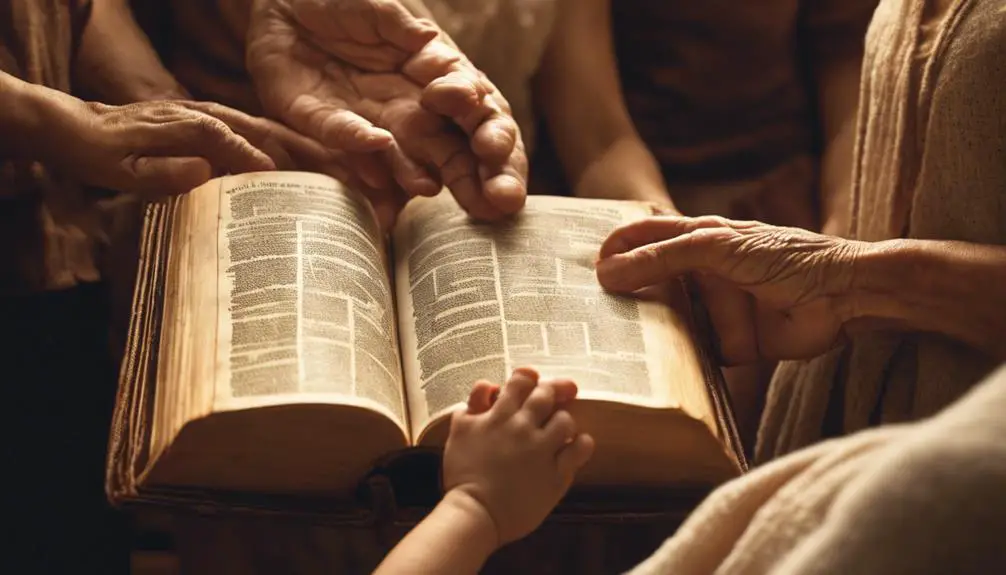
Generational Blessings in the Bible
Imagine, for a moment, that your actions today could shape the fortunes of your descendants for centuries to come. You're probably wondering how such a monumental task could be possible.
The Bible, filled with tales of generational blessings, suggests that our actions can indeed have profound implications for our lineage. From Abraham's covenant to David's dynasty, these blessings have shaped entire generations.
But what do they really mean, and how might they apply to your life today? Get ready to unlock some fascinating insights that could change your perspective on faith and family.
Key Takeaways
- Generational blessings, rooted in biblical narratives, manifest as prosperity and divine favor passed down through faith.
- Divine promises and covenant, especially to Abraham and David, illustrate generational blessings and the inheritance of faith.
- Modern faith practices emphasize spiritual blessings available to all believers through faith in Christ, promoting inclusivity.
- There's a transformation in blessings from Old to New Testament, shifting focus from physical prosperity to spiritual wealth.
Understanding Generational Blessings
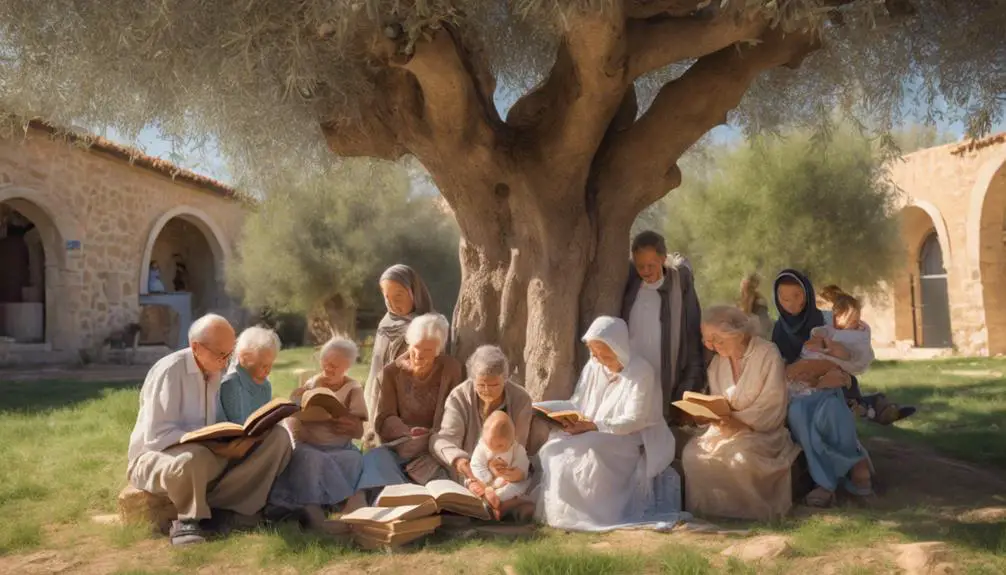
Your journey into understanding generational blessings begins with exploring their biblical roots, deeply entrenched in the narratives of patriarchs such as Abraham, Isaac, and Jacob. This exploration is essential to grasp the complex mechanisms of 'Blessing Manifestation' and 'Generational Prosperity'.
The concept of generational blessings, a divine favor passed down through generations, isn't just a religious folklore, but a biblical reality. It isn't a coincidence that the descendants of Abraham, Isaac, and Jacob enjoyed significant prosperity. It was a direct outcome of generational blessings. Often, this prosperity wasn't merely financial, but encompassed aspects like wisdom, influence, and spiritual richness.
The 'Blessing Manifestation' is the tangible evidence of these blessings in the lives of recipients. It's observable, quantifiable, and often has a profound impact on the individual and the community. The inherent prosperity isn't just about material wealth, but rather, it represents a holistic wellness – a thriving life that's spiritually, emotionally, and physically prosperous.
As you delve deeper, you'll find that understanding generational blessings isn't about seeking wealth or fortune. It's about acknowledging the divine favor that shapes lives and destinies across generations, and recognizing the profound implications it has for individuals and communities alike.
Abraham's Covenant: A Case Study
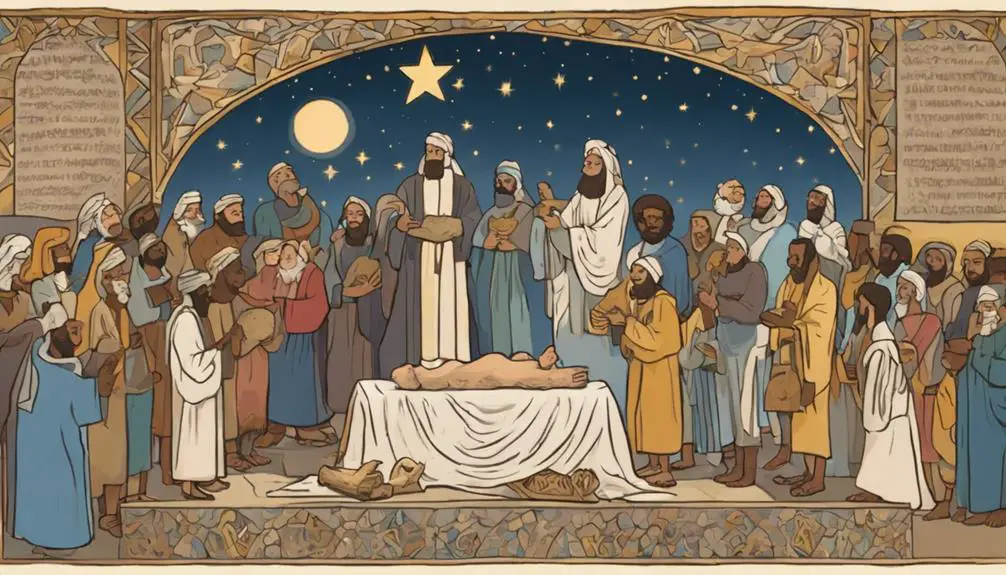
To truly grasp the magnitude of generational blessings, let's take an analytical look at Abraham's covenant, a pivotal biblical case study that illuminates the concept in practice. The covenant's significance lies in God's promises to Abraham and his descendants, a divine pact sealed by Abraham's faith.
The covenant, a binding agreement, was initiated by God, creating a relationship of mutual commitment. Its significance lies in the assurance of progeny and land to Abraham, promises that would span generations. You'll find these promises brought to fruition throughout the Bible, underscoring the enduring nature of God's generational blessings.
Abraham's faith is a key component in this equation. It was his unquestioning belief in God's promises that activated the covenant. There's a profound lesson here: faith is the conduit through which generational blessings flow. It was Abraham's faith, not his works, that was credited to him as righteousness, and it's this righteousness that set the stage for the blessings to his descendants.
The Abraham covenant case study thus shows that generational blessings are tangible, enduring, and tied to the faith of the blessed. It's an intriguing illustration of the Bible's portrayal of generational blessings.
David's Dynasty and God's Promise
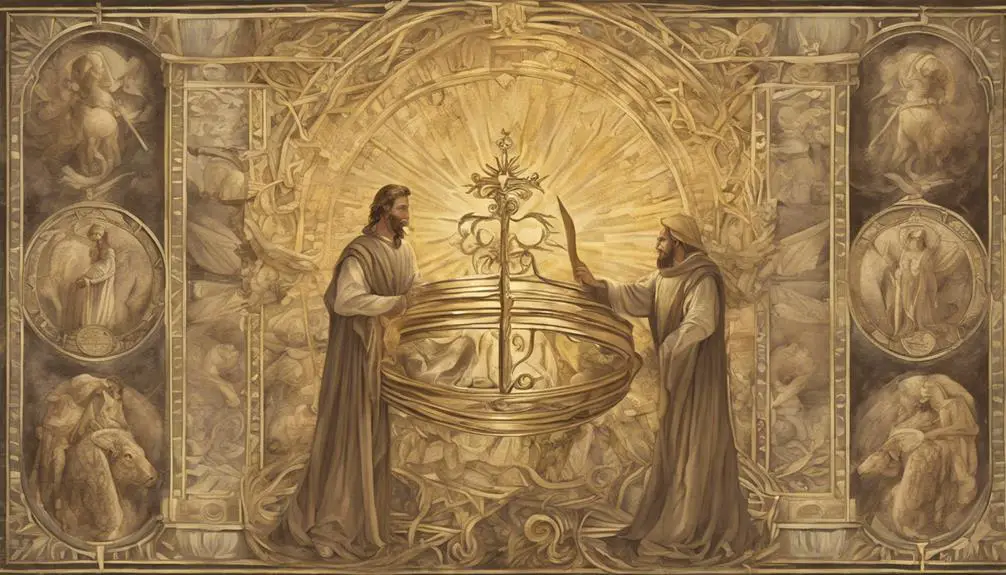
Just as with Abraham, the biblical narrative of King David's dynasty offers another compelling exploration of generational blessings, particularly through the lens of God's covenantal promise to David. This divine assurance, expressed through the Royal Prophecy, pledged an enduring dynasty to David's lineage.
Delving into the text, you'll find that the promises made to David extend beyond the temporal. They aren't just about the success or prosperity of an earthly kingdom. Rather, the divine covenant encompasses a spiritual realm where David's offspring would assume a significant role. This interpretation can be discerned from the prophecy in 2 Samuel 7:16, where God pledged to David, 'Your house and your kingdom will endure forever before me; your throne will be established forever.'
In essence, this promise to David is a generational blessing, extending to his descendants and establishing a continuous lineage. The narrative underscores God's faithfulness, reinforcing the belief that His promises aren't merely transient or ephemeral, but endure across generations.
Therefore, David's dynasty illustrates the profound concept of generational blessings in biblical terms, where God's covenantal promise shapes the destiny of multiple generations.
Blessings in the New Testament

While the Old Testament's depictions of generational blessings are deeply rooted in the narratives of Abraham and David, the New Testament reframes these blessings in light of Christ's teachings and the early Christian community's experiences. You witness a shift from physical prosperity to a focus on spiritual wealth, the New Testament Prosperity.
In this context, blessings are no longer confined to material possessions or territorial gains; they become elements of Divine Inheritance bestowed through faith in Jesus Christ. You see this in Paul's letter to the Ephesians (1:3) where he declares, 'Blessed be the God and Father of our Lord Jesus Christ, who's blessed us in Christ with every spiritual blessing in the heavenly places.'
This redirection of blessings points to the eternal, spiritual inheritance for believers in Christ, rather than temporal, earthly prosperity. The blessings in the New Testament, therefore, embody the concepts of grace, salvation, peace, and the indwelling of the Holy Spirit. These aren't inherited by birthright or earned by works, but are freely given through faith in Jesus Christ, marking a significant shift from the Old Testament's depiction of generational blessings.
Implications for Modern Faith Practices

Understanding the shift from Old Testament generational blessings to New Testament spiritual blessings can significantly influence your modern faith practices, shaping how you perceive and receive God's blessings. The concept of Faith Transferability becomes critical here, implying the transmission of blessings from one generation to another, spiritually in this era of the Modern Covenant.
The table below provides a concise look at this shift and its implications:
Old Testament Generational Blessings |
New Testament Spiritual Blessings |
Implications for Modern Faith Practices |
|---|---|---|
Physical and material blessings |
Spiritual and eternal blessings |
Emphasizes spiritual growth and eternal life |
Depends on the obedience of forefathers |
Based on personal faith in Christ |
Encourages individual responsibility in faith |
Passed down to descendants |
Available to all believers |
Promotes inclusivity and equality in faith |
Hence, you're called to live by the Modern Covenant, focusing on personal faith and spiritual growth. This doesn't negate the importance of generational blessings, but redefines them in a spiritual context. As you model faith and obedience, you're creating a spiritual legacy that transcends time and space, impacting generations to come. This is the essence of Faith Transferability in the Modern Covenant.
Frequently Asked Questions
How Does the Concept of 'Generational Blessings' Differ Across Various Christian Denominations?
You're asking about the differences in 'blessings interpretation' across Christian denominations. It's not a simple answer. Each denomination has distinct beliefs, and these create variations in their understanding of generational blessings.
Some may see it as a literal, direct blessing passed down, while others might interpret it metaphorically or symbolically. These 'denominational differences' can greatly influence how generational blessings are viewed and understood within each faith community.
Can Generational Blessings Be Linked to Any Scientific or Psychological Theories About Inherited Traits or Behaviors?
You might link 'generational blessings' to scientific theories like 'genetic blessings', suggesting inherited positive traits.
Also, 'behavioral inheritance' could play a part, where learned behaviors are passed down.
However, it's crucial to consider that these are hypotheses, not proven facts. They'll require more research for validation, but they do offer interesting perspectives on how generational blessings could potentially manifest in a scientific or psychological context.
Are There Any Notable Contrasts Between Generational Blessings and Curses as Portrayed in the Bible?
Yes, there are. In the Bible, blessings signify generational equity, promoting prosperity and positive outcomes for future generations.
In contrast, curses often result in hardship and adversity, impacting generations negatively.
It's important to note the Bible portrays these outcomes as directly linked to one's actions and choices, emphasizing personal responsibility.
This stark dichotomy between blessings and curses illustrates the profound impact of our decisions on subsequent generations.
How Has the Understanding of 'Generational Blessings' Evolved Over Different Historical Periods?
You've seen how the interpretation of 'blessings' has evolved across different historical periods. It's moved from being purely material in biblical context to encompassing spiritual and emotional well-being. This shift reflects changing societal values and needs.
What hasn't changed, however, is the belief in the power of these blessings to impact generations. It's a testament to the enduring relevance of such concepts, even as they're reinterpreted through the ages.
How Have Other Religions or Belief Systems Interpreted the Idea of Blessings Passed Down Through Generations?
In other belief systems, the idea of blessings passed down through generations is interpreted differently.
For instance, in Buddhism, karma impacts future generations rather than specific blessings.
In Shintoism, ancestral worship plays a significant role, and blessings are believed to originate from honoring ancestors.
It's a fascinating contrast to the concept of generational blessings in the Bible.
Conclusion
In conclusion, you've seen how generational blessings are woven throughout the Bible, from Abraham's covenant to David's dynasty and into the New Testament. These blessings, enduring through generations, underline God's enduring faithfulness.
They're not just historical footnotes but essential constituents in your faith journey. Reflect on them, understand their implications, and incorporate their truths into your life, for they offer profound insights into God's character and His intentions for His people.

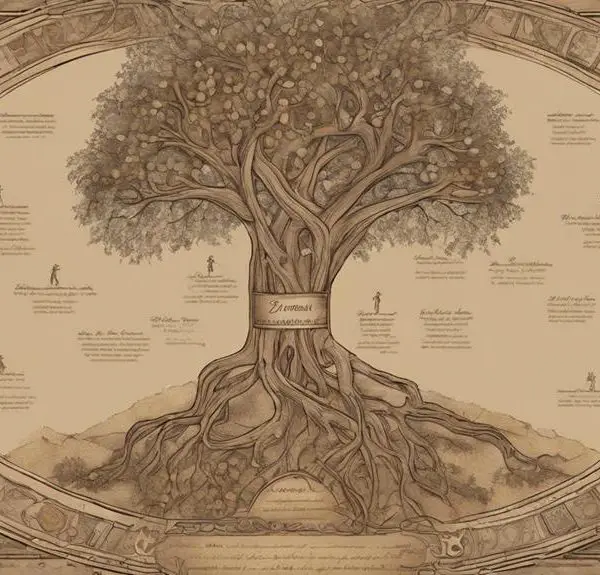

Sign up